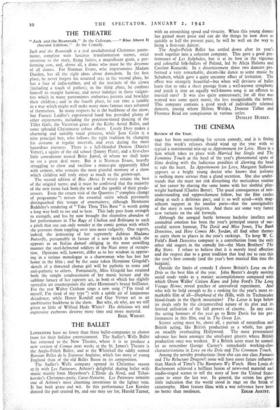THE THEATRE
" Jack and the Beanstalk." At the Coliseum. " Rise Above It (Second Edition)." At the Comedy.
Jack and the Beanstalk is a real unadulterated Christmas panto- mime, complete with luscious transformation scenes, strict attention to the story, flying fairies, a magnificent giant, a per- forming cow, and, above all, a dame who must be the doyenne of all dames. For Norman Evans, who impersonates Madam Durden, has all the right ideas about damedom. In the first place, he never forgets his assumed sex; in the second place, he has a face of india-rubber, and all the instincts • of the clown (including a touch of pathos); in the third place, he confines himself to straight humour, and never indulges in those vulgari- ties which in many pantomimes embarrass parents and bewilder their children ; and in the fourth place, he can time a tumble in a way which might well make many more famous stars ashamed of themselves. In many respects he is the backbone of the show, but Francis Laidler's experienced hand has provided plenty of other enjoyments, including the precision-timed dancing of the Tiller Girls, the Victorian grace of the Kirby Aerial Ballet, and some splendid Christmassy colour effects. Lorely Dyer makes a charming and suitably vocal princess, while Jean Cohn is a trim principal boy, who follows the right tradition by changing his costume at regular intervals, and even during the most hazardous journeys. There is a full-blooded Demon (Dimitri Vetter), a squire of the old school (Jimmy Plant), and a first-class little comedienne named Betty Jumal, of whom we shall hope to see a great deal more. But it is Norman Evans, bravely struggling to chew and swallow a mince-pie apparently filled with cement, who remains the most grateful memory of a show which children will truly enjoy as much as the grown-ups.
The second edition of Rise Above It wisely retains the best of the original turns; and it must be confessed that the majority of the new items lack both the wit and the sparkle of their prede- cessors. Even the return visit of the Queeries (" complete change of programme ") misses the essential satire which previously distinguished this troupe of entertainers; although Hermione Baddeley's rendering of "Take Thou This Rose" is worth going a long way both to see and to hear. This lady goes from strength to strength, and has by now brought the shameless abandon of her performances in The Rage of Chelsea and Boliviana to such a pitch that one can only wonder at the comic genius with which she prevents them toppling over into mere vulgarity. One regrets, indeed, the jettisoning of her supremely dubious Madame Butterfly, presumably in favour of a new sketch in which she .appears as an Italian damsel obliging in the most unwilling manner the steel-helmeted soldiers of the Nazi army of occupa- tion. Opinions will, however, differ as to her wisdom in appear- ing in a serious monologue as a charwoman who has lost her home in the blitz ; and by the same token Hermione Gingold's sketch of a thwarted chorus girl will be pathetic to some and anti-pathetic to others. Fortunately, Miss Gingold has retained both the simple condescension of her music lecture and the sublime lunacy of her tapestry act, in both of which her slightly surrealist art counterpoints the other Hermione's brutal brilliance. For the rest Walter Crisham sings a new song (" I'm tired of myself, I'm tired of my type ") with a subtle air of languorous decadence, while Henry Kendall and Guy Verney as as an unobtrusive backbone to the show. But why, oh why, are we still given so little of Wilfred Hyde White? His delicious wit and expressive eyebrows deserve more time and more material.
BASIL WRIGHT.


























 Previous page
Previous page